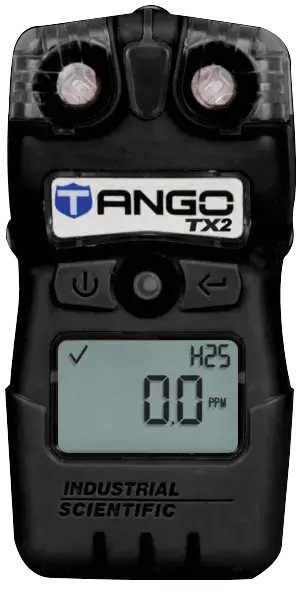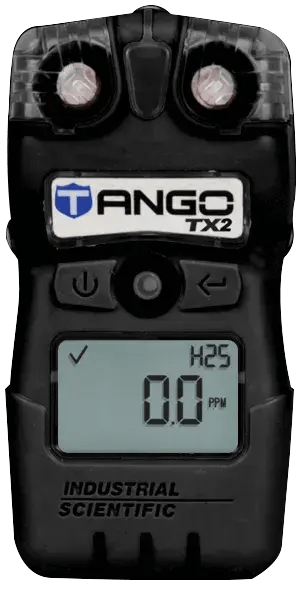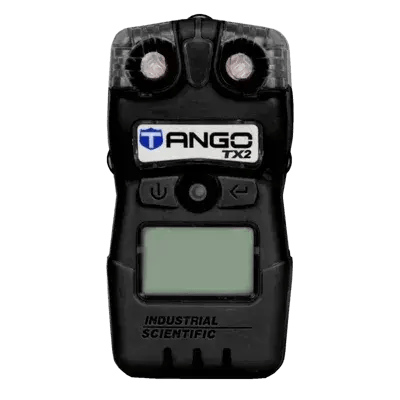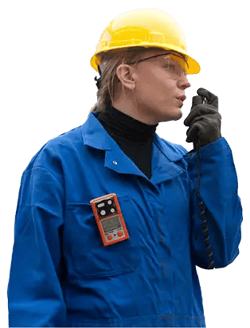Tango® TX2 Two-Gas Monitor
Built for You, Built to Last
Protect workers, reduce false alarms, and spend less time managing your gas detector fleet with the Tango TX2 Two-Gas Monitor. Unlike other two-gas monitors that use combination sensors, the Tango TX2 uses individual sensors to increase alarm accuracy so you can reduce unnecessary shutdowns and improve incident data quality.

Increase alarm accuracy with the only two-gas monitor built with individual sensors.
Count on quality with a Guaranteed for Life™ warranty.
Get two-year run time with a replaceable battery that eliminates the need for a charging station.

Customizable display options to see the gas readings you need most.
Replaceable battery that eliminates the need for charging

- DSX™ Docking Station Compatibility
Pair with a docking station to calibrate, bump test, and upload gas detector data automatically.
- Pairs with iNet® Exchange
Eliminate maintenance and repairs by getting replacement monitors shipped directly to your door.

Compare Monitors
Interested in learning how Tango TX2 stacks up against other two-gas monitors? Take a look at this chart to compare the maintenance, reliability, and warranty of leading two-gas monitors.
What is the advantage of using the Tango® TX2?
The Tango TX2 tw0-gas monitor is the size of a credit card and weighs less than a smartphone. A two-year run time from a single, replaceable battery eliminates the need for charging infrastructure and simplifies gas detector management. Unlike other two-gas monitors that use combination sensors, the Tango TX2 two-gas monitor uses individual sensors, increasing alarm accuracy so you can reduce unnecessary shutdowns and improve incident data quality.
When should I use a Tango TX1 versus a Tango TX2?
The Tango TX1 is best for single-gas detection using DualSense® Technology for extra coverage of a single gas hazard. If you need to monitor a second gas, you should use the Tango TX2.
What sensors does the Tango TX2 support?
The Tango TX2 two-gas monitor can support the following sensors: CO, H2S, HCN, NH3, SO2, NO2, CO H2Low.
Are there any restrictions on sensor combinations?
Any two sensors from the supported sensor list can be combined in the Tango TX2 two-gas monitor.
Are sensors interchangeable?
The sensors are interchangeable. If you switch a sensor, the Tango TX2 two-gas monitor will immediately detect the new configuration.
With two sensors, how do I know what gas type reading is displayed?
The TangoTX2 two-gas monitor can display readings from sensor one, readings from sensor two, or alternate between the two readings. The default setting is for an alternating display, but users can choose to alternate the readings every three seconds or choose one sensor to be displayed.
If I choose to display a specific sensor, what happens when the other sensor goes into alarm?
When a sensor goes into alarm, the readings alternate regardless of the display option chosen.
Does the Tango TX2 come with a warranty?
Yes, the Tango TX2 two-gas monitor is Guaranteed for Life™ to ensure you always have the highest quality gas monitor.
Warranty
Guaranteed for Life™. Warranted for as long as the monitor is supported by Industrial Scientific Corporation (excludes sensors, batteries, and filters). CO and H2S sensors are warranted for three years. All other sensors are warranted for two years.
Temperature Range
-40 °C to 50 °C (-40 °F to 122 °F) **
Humidity Range
15-95% non-condensing (continuous)
Sensors
CO, CO/H2, H2S, NO2, SO2 electrochemical sensor technology
Battery
3.6 V primary lithium-thionyl chloride (Li-SOCl2); 1.5AH, 2/3AA; replaceable;
non rechargeable; always on; up to two-year run time depending on operating conditions
Certifications
DIRECTIVE OR CB AREA CLASSIFICATION STANDARDS
ATEX1: Ex ia I Ma;
Ex ia IIC T4 Ga; Equipment Group and Category: I M1 and II 1G,
EN 60079-0: 2012
EN 60079-11: 2012
EN 50303: 2000
IECEx3 Ex ia I Ma, Ex ia IIC T4 Ga
IEC 60079-0: 2011
IEC 60079-11: 2011
UL (C-US)4: Class I, Groups A, B, C, and D; Class II, Groups E, F, and G; T4;
Exia Class I, Zone 0, AEx ia IIC T4
UL 913 8th Ed.
UL 60079-0 6th Ed.
UL 60079-11 6th Ed.
CSA C22.2 No. 157

